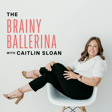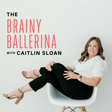
68. Fueling the Mind-Body Connection with Registered Sports Dietitian Lisa Rivera
In this episode, I’m joined by registered sports dietitian Lisa Rivera, who brings her unique background in both dance and nutrition to the conversation. Lisa shares her personal journey of healing her relationship with food, how proper fueling transformed her dance career, and why she’s passionate about helping dancers thrive physically, mentally, and emotionally.
From understanding the mind-body connection to diving into gut health, brain function, stress management, and supplements, this episode is packed with practical insights to help dancers improve performance, resilience, and well-being.
Key Points in this Episode:
- Lisa’s journey from struggling with body image as a dancer to becoming a sports dietitian.
- How nutrition impacts not just physical performance, but also focus, mood, and emotional health.
- The role of the gut microbiome and how it connects to brain function.
- Foods and habits that support gut health and mental clarity.
- Fueling strategies to manage performance anxiety and stressful rehearsal weeks.
- Supplements dancers should consider (like omega-3s and magnesium) and how to choose quality brands.
- Tips for traveling dancers to maintain digestion and energy on tour.
- One small step dancers can take this week to better fuel their body and brain.
Connect with Lisa:
WEBSITE: https://performancenutritioncompany.com/p/home
Register for Lisa’s course ‘Nutrition for Dancers’ and receive 50% off with code BrainyBallerina50
INSTAGRAM: instagram.com/nutritionco_for_dancers
Links and Resources:
Get your copy of The Ultimate Audition Guide
Set up ticketing for your next event with DRT (Make sure to mention that The Brainy Ballerina sent you!)
Let’s connect!
My WEBSITE: thebrainyballerina.com
INSTAGRAM: instagram.com/thebrainyballerina
1-1 CAREER MENTORING: book your complimentary career call
Questions/comments? Email me at caitlin@thebrainyballerina.com

